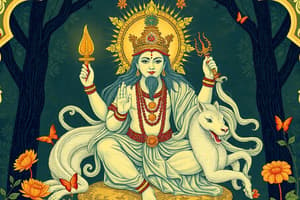Podcast
Questions and Answers
Which Indian literary work has been translated into over 60 languages and adapted worldwide?
Which Indian literary work has been translated into over 60 languages and adapted worldwide?
- Modern Hindi Literature
- Dharamvir Bharti's plays
- Premchand's works
- The Vedas (correct)
When were the Vedas composed?
When were the Vedas composed?
- Between 500 BCE and 0 CE
- Between 1500 AD and 1000 AD (correct)
- Between 1000 BCE and 500 BCE
- Between 0 CE and 500 CE
Which of the following authors wrote in Urdu before transitioning to writing in Hindi?
Which of the following authors wrote in Urdu before transitioning to writing in Hindi?
- Munshi Premchand
- Kaka Hathawadekar
- Dharamvir Bharti
- Premchand (correct)
Who among the authors challenged conventional norms through their narratives?
Who among the authors challenged conventional norms through their narratives?
Which figure in modern Hindi literature experimented with form and content, pushing boundaries in playwriting?
Which figure in modern Hindi literature experimented with form and content, pushing boundaries in playwriting?
What is the main focus of 'Ramayana'?
What is the main focus of 'Ramayana'?
Which literary work contains stories involving animals like lions, monkeys, and parrots?
Which literary work contains stories involving animals like lions, monkeys, and parrots?
During which centuries were classical Hindi literature works typically written?
During which centuries were classical Hindi literature works typically written?
What type of themes are commonly found in classical Hindi literature?
What type of themes are commonly found in classical Hindi literature?
Which epic poem focuses on the Kurukshetra War between two factions of the Kuru royal family?
Which epic poem focuses on the Kurukshetra War between two factions of the Kuru royal family?
Flashcards are hidden until you start studying
Study Notes
Hindi Books: A Rich Literary Heritage
Hindi books encompass a wide range of genres, from classic literature to contemporary works. They offer readers insights into various aspects of Indian culture and society, historical events, social issues, and personal experiences. This diverse collection is a reflection of India's literary heritage, engaging both local readers and international audiences.
Classical Hindi Literature
Classical Hindi literature refers to texts written between the 9th and 17th centuries CE. These works often contain religious, philosophical, or poetic themes. Some notable examples include "Ramayana," "Mahabharata," "Panchatantra," and "Vedas." These stories have been passed down through generations and continue to shape cultural identity today.
Ramayana & Mahabharata
"Ramayana" and "Mahabharata" are two epic poems recounting the lives of Hindu gods and heroes. The former focuses on King Rama and his quest for justice, while the latter revolves around the Kurukshetra War between two factions of the Kuru royal family. Both tales reflect societal values during their respective periods, offering historical context and moral lessons.
Panchatantra
The "Panchatantra" is a collection of animal fables attributed to Vishnu Sharma. It provides wisdom and life lessons through cleverly told stories involving animals like lions, monkeys, and parrots. Its influence extends beyond India; it has been translated into over 60 languages and adapted across media platforms worldwide, demonstrating its enduring appeal and relevance.
Vedas
The oldest known scriptures of Hinduism, the "Vedas," consist of four main sections - Rigveda, Yajurveda, Samaveda, and Atharvaveda. Composed between 1500 BCE and 1000 BCE, they delve into various aspects of life such as rituals, morality, astronomy, and science. Despite being ancient, these texts are still studied by scholars due to their profound impact on Indian thought and religion.
Modern Hindi Literature
In contrast to classical works, modern Hindi literature spans approximately from the mid-19th century until present day. It includes novels, short stories, plays, poetry, and nonfiction pieces. Some key authors who contributed significantly to this era include Premchand, Munshi Prem Chand, Dharamvir Bharti, and Kaka Hathawadekar among others. Their works reflected the changing times, touching upon themes like patriotism, nationalism, love, relationships, and societal changes.
Premchand & Munshi Premchand
Notable figures in modern Hindi literature were Premchand and Munshi Premchand. Premchand wrote in Urdu initially before switching to Hindi later in his career. His works critiqued colonial rule and explored complex human emotions. Munshi Premchand, however, continued writing in Hindi throughout his career, producing classics like "Godaan," "Sevasadan," and "Nirmala." His narratives dealt with social realities and challenged conventional norms.
Dharamvir Bharti & Kaka Hathawadekar
Dharamvir Bharti was another influential figure in modern Hindi literature. He experimented with form and content, pushing boundaries in playwriting. His best-known plays include "Andha Yug" and "Seema," which addressed political unrest and communal tensions respectively. On the other hand, Kaka Hathawadekar gained recognition for his satirical short stories, exposing corruption and hypocrisy within upper-class society. His work served as a mirror to society, provoking thought and debate.
English Translations of Hindi Literature
English translations of Hindi literature have played a crucial role in making these works accessible to a global audience. Translators like Freny Mehta, Alok Bhalla, and Gita Rajan have contributed significantly to this effort. Their work allows readers worldwide to understand and appreciate the richness of Hindi literature beyond its native language boundaries. Today, many publishers specialize in translating works from regional languages into English, contributing towards cross-cultural understanding and appreciation.
In conclusion, Hindi books is a vast field that encompasses centuries of literary history. From classical epics to modern narratives, these texts offer insights into various aspects of Indian culture and society, while also reflecting changes over time. The availability of English translations further broadens accessibility and global reach, ensuring these valuable works continue to influence and inspire readers around the world.
Studying That Suits You
Use AI to generate personalized quizzes and flashcards to suit your learning preferences.




